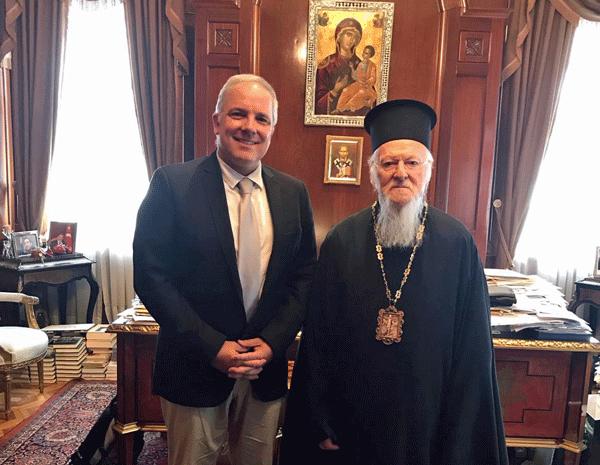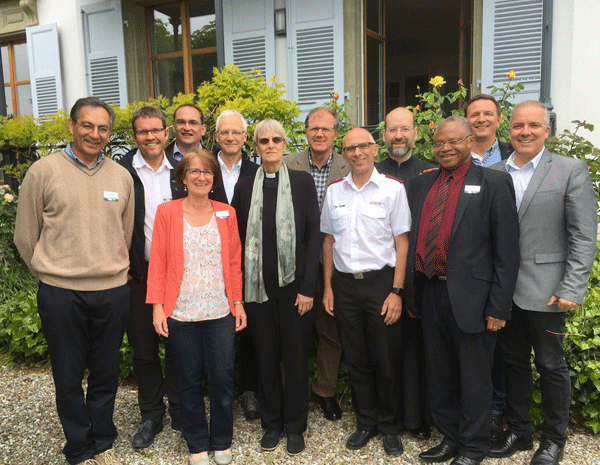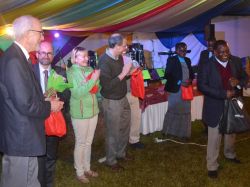At the end of the liturgy, Archbishop Job Getcha (the patriarch's delegate to the World Council of Churches with whom we have regular contact) escorts us to the "throne room" to see when the patriarch could receive us. After 45 minutes of discussion with the Greek ambassador to Turkey, Bartholomew decided that the meal could no longer wait and he invited us to his table.
On this very large table sit, to my left Antoine, the patriarch's younger brother (he has a hair salon in Divonne-les-Bains) and to my right, Father Joachim, originally from Thessaloniki, secretary of the Holy Synod (a very important position).
In front of me are sitting three archbishops and next to the patriarch, the ambassador of Greece.
Women are not allowed at this table (we are in a male monastery) and Sylviane must join the other women in a room on the floor below.
The meal went quickly because it is the second to last day of Lent (no meat or dairy).
We followed the patriarch into his apartments to wait behind a large wooden door: his office.
After a few moments, he greets us with a big smile and welcomes us in French. We talk about 2033, the possible commemoration of three years of Jesus' ministry and the decade of the resurrection.
He was very favorable and emphasized the missionary aspect that the process should have: "We must announce the Risen Christ to all those who do not believe in the resurrection, a pedagogical approach must be used" he said.
After 20 minutes of conversation and an official photo, we leave him with a warm handshake. He reiterates his expectation of receiving news of the progress of the project and confirms Archbishop Job in his responsibility to make the link with this project.
I leave my second interview with this man who has such great responsibilities, filled with joy and gratitude.
We leave the apartments and stop in a large living room with many chairs around it. That's where we meet Sylviane. We then engage in a big discussion with Archbishop Job on 2033, the Orthodox Church, history and the future. Exciting!
Archbishop Job made a bold suggestion: "Why don't we ask Patriarch Bartholomew to make a joint statement with Pope Francis on the decade of resurrection?", and I add: " Yes, we could also ask Archbishop Justin Welby (Anglican Church), Pope Tawadros (Coptic Orthodox Church), Efraim Tendero, Secretary of the World Evangelical Alliance and some others!"
The adventure continues with surprising stops along the way towards 2033...
Olivier Fleury
Patriach Bartholomew Archbishop of Constantinople - Easter Message
Venerable brothers and beloved children in the Lord,
Having run the course of the race of Holy and Great Lent in prayer and fasting, and having reached the salvific passion of Christ God, today we are rendered participants in the joy of His splendid Resurrection.
The experience of Resurrection belongs to the core of Orthodox identity. We celebrate the Lord’s Resurrection not only during the feast of Holy Pascha and the ensuing paschal period, but on each Sunday and at each Divine Liturgy, which is always a luminous festivity. The Christian life in all its dimensions – in divine worship as well as in our life and witness in the world – bears a resurrectional spirit and is shaken by the victory of the risen Christ over death and by the expectation of His eternal kingdom.
Man is unable of itself to handle fear and the inevitability of death, which it confronts throughout and not merely at the conclusion of life. The sense that life is “a journey toward death” – without any hope of escape – does not lead to any humanization of life or enhancement of responsibility and concern for the present and future. On the contrary, humanity recoils and disengages from the essential elements of life, ending up in cynicism, nihilism and despair, in a fabrication of uninhibited self-realization and in the graceless eudemonism of “let us eat and drink, for tomorrow we shall die.” Science, social and political activism, economic progress and prosperity cannot provide a way out of this impasse. Whatever is created by humanity bears the stigma of death, and it does not lead to salvation, because it is itself in need of salvation. The desire for eternity cannot be concealed by worldly goods and cannot be satisfied by the extension of life or the promise of false paradise.
Orthodoxy offers the Truth of the saving Gospel of the Resurrection to the contemporary rationalistic man. For us Orthodox, Pascha is not simply the remembrance of the Lord’s Resurrection, but also the experience of our own regeneration in the Risen Christ; it is the foretaste and conviction of the eschatological fulfillment of the divine Economy. The faithful Christian knows that existential fullness is a gift of divine grace. In Christ, our life is transfigured, transformed into a journey toward deification. For St. Paul, Christians are distinguished from “others,” who “do not have hope” (cf. 1 Thess. 4.13). They hope in Christ, who is “our life and resurrection,” “the first and the last and the living one” (Rev. 1.17–18).
The salvific presence of Christ in our life and the hope of the heavenly kingdom are inseparably linked to our Christian existence, which functions and is realized as a creative and transformative force in the world. It is by no means accidental that, before modern civilization could appreciate and establish man as the maker of history, the faithful were called to become “coworkers of God” (cf. 1 Cor. 3.9). It is a complete misinterpretation of Orthodox self-consciousness as well as of the social and charitable work of the Church to claim that Orthodoxy is introverted, unworldly and indifferent to history and civilization.
Venerable brothers and beloved children,
Pascha is not just the greatest feast and celebration of the Orthodox Church. Resurrection is our entire faith, all of our ecclesiastical life, the whole civilization of Orthodoxy. And from this inexhaustible source, the whole eschatological drive of our Orthodox life and witness derives its origin and nourishment. In the Resurrection and from the Resurrection, we as faithful come to know our eternal destiny; we discern the content and direction of our mission in the world; and we discover the meaning and truth of our freedom. He who descended to the lowest extremities of the earth, abolishing the gates of Hades and power of death, rises from the tomb as the liberator of humankind and all creation. It is this gift of freedom that human beings are called to receive freely, becoming incorporated in the Church as “the community of deification,” where freedom is the foundation, the way and the destination. As a gift from Christ, this freedom is experienced and expressed as “speaking the truth in love” (cf. Eph. 4.15), as an event of communion and solidarity. “For you were called to freedom, brethren; only do not use your freedom as an opportunity for the flesh, but through love be servants of one another” (Gal. 5.13). In the Church, “we exist in the way of the Resurrection,” looking unto the “common resurrection” in the never-ending day of the Kingdom.
With these thoughts, we give with purity of heart, glory to the Risen Lord that “gave rise to life in all,” to God that is “with us” and “for us,” Who has promised to be with us to the end of the ages. And we exclaim the joyous paschal greeting “Christ is Risen!” as we pray to the Maker and Redeemer of the world, the giver of all gifts, to illumine all of our lives through the light of His salvific Resurrection and to grant to all the fulfillment of joy and all His saving gifts, so that His all-holy and supra-celestial name may be praised and blessed.
Main Image - Olivier Fleury and Patriarch Bartholomew Istanbul, Good Friday April 2019



